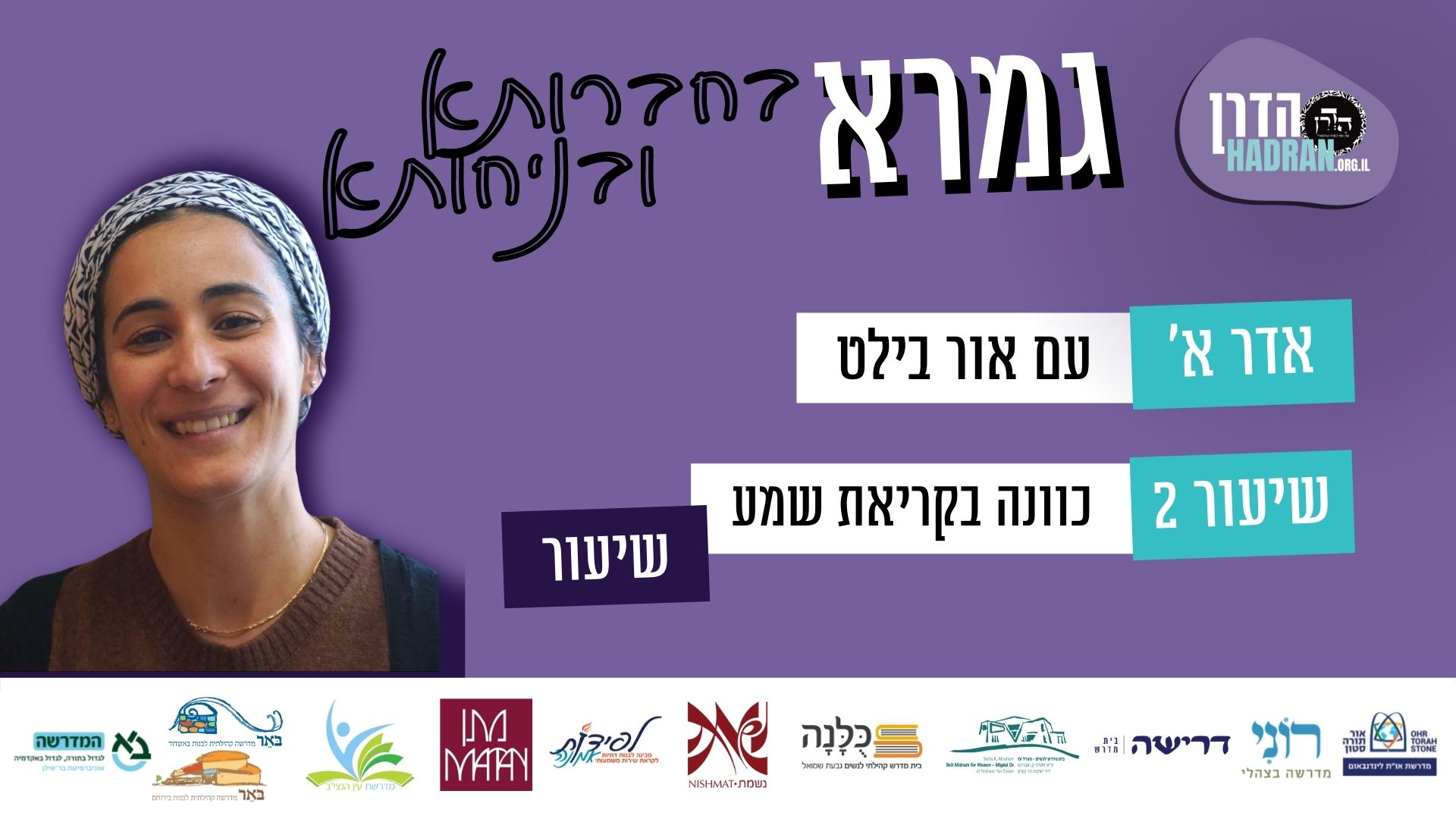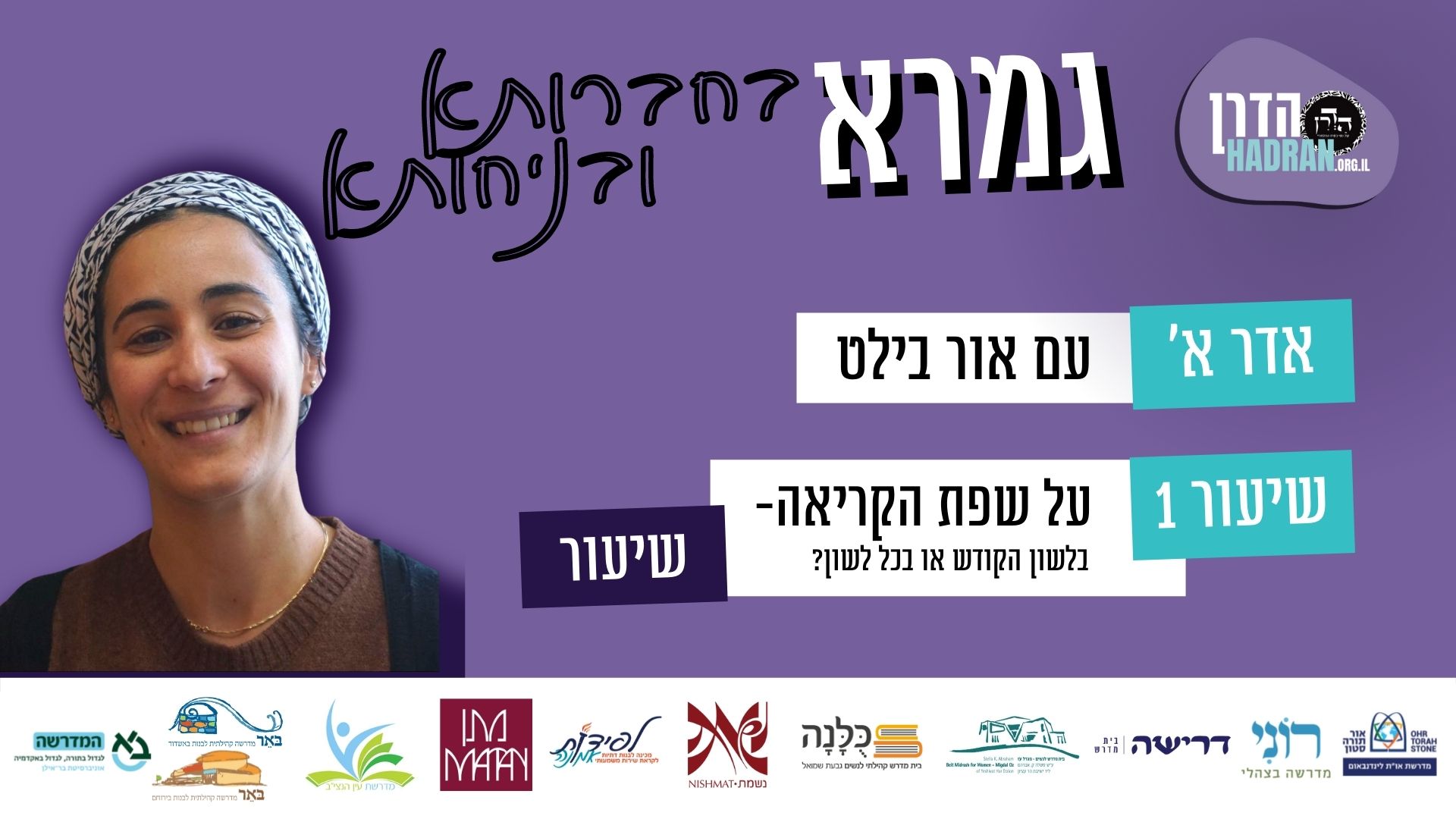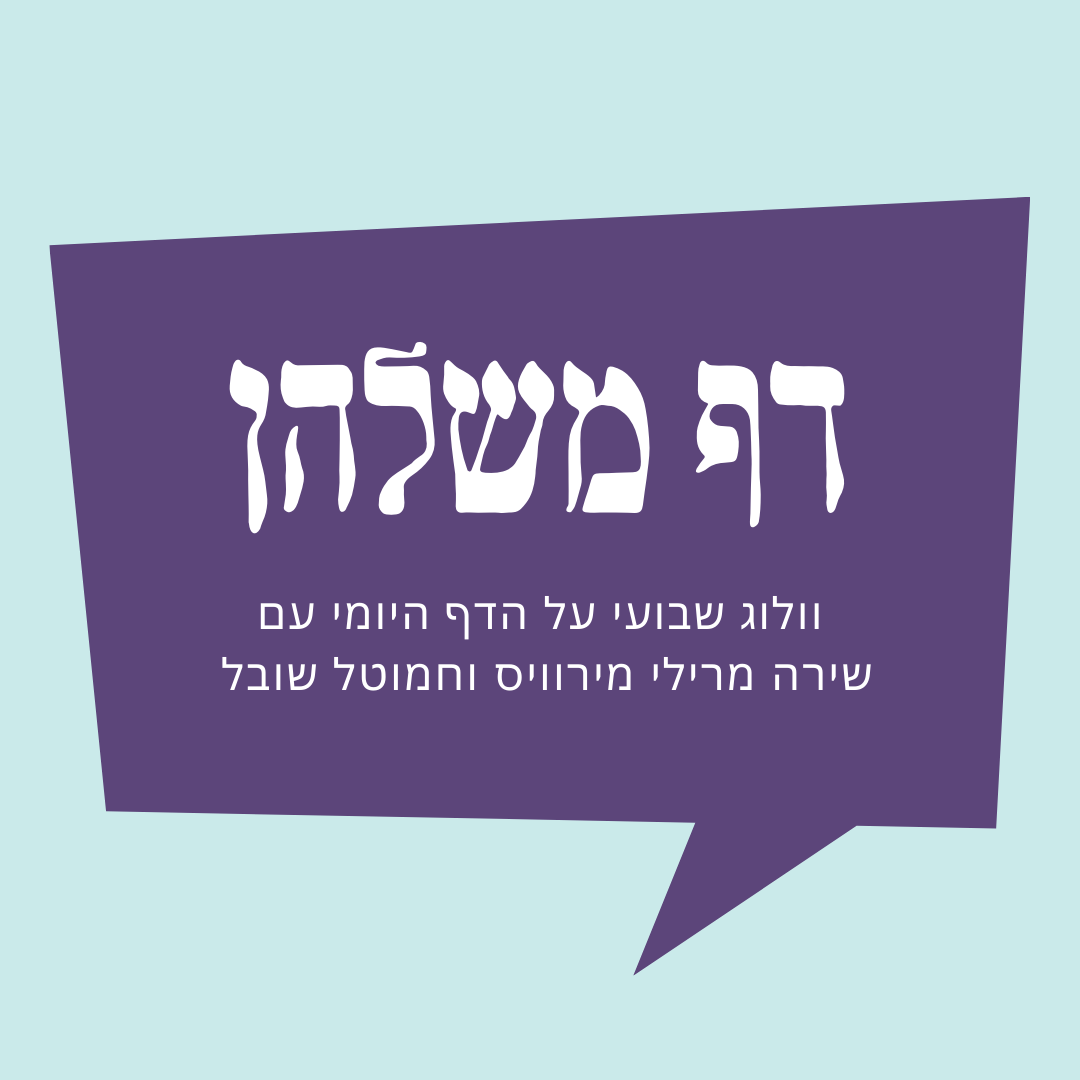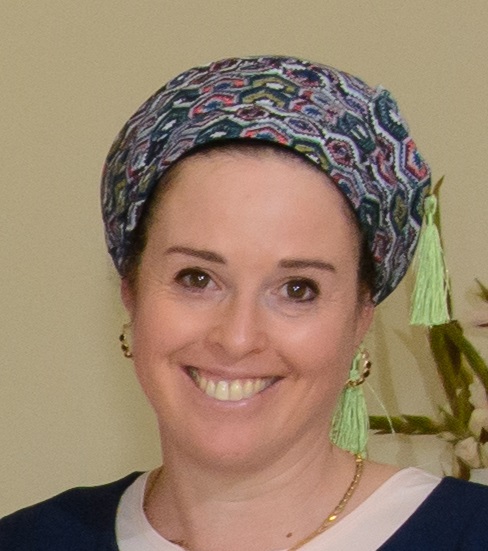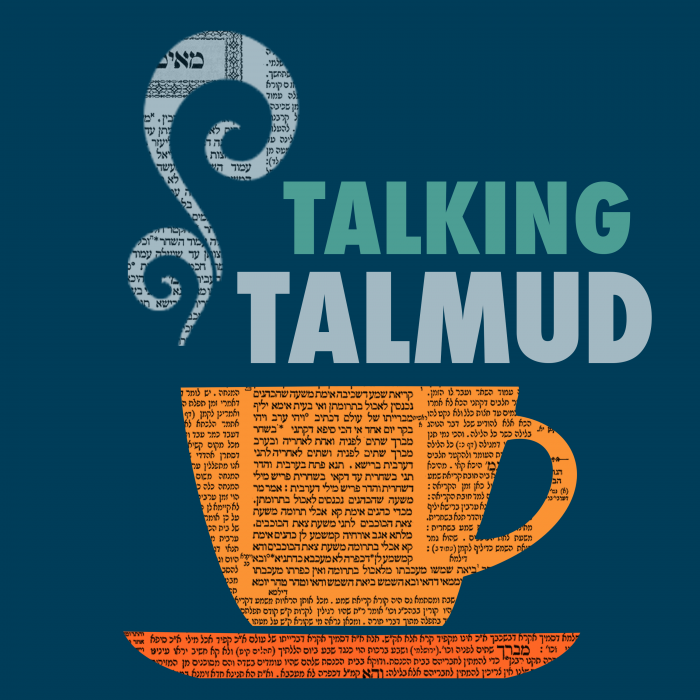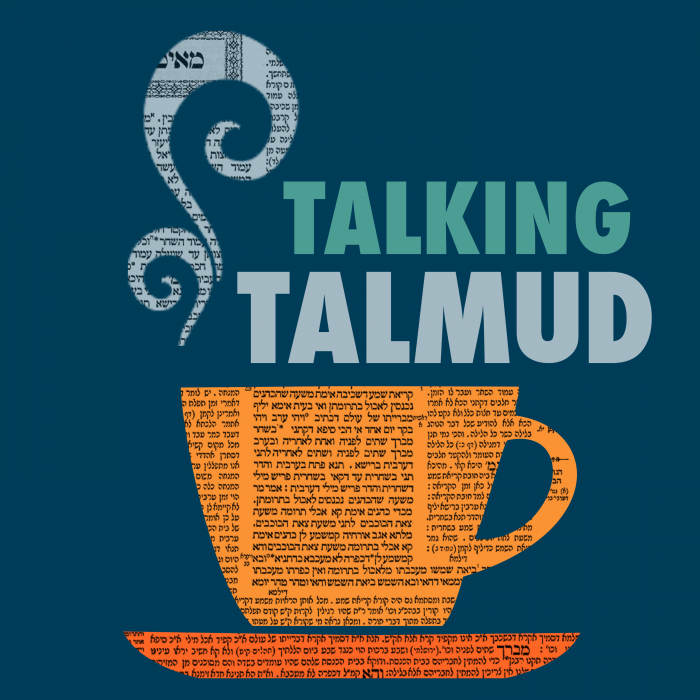המשנה מזכירה עוד דברים שאי אפשר להגיד בתפילה כי חוששים שהשליח ציבור הוא מין. מה עושים כשליח ציבור טועה בתפילתו? כמה דינים נזכרים בקשר לשליח ציבור בברכת כהנים בגלל בחשש שיתבלבל בתפילתו. כגון, מה עושים אם הוא הכהן היחיד – האם יכול להגיד ברכת כהנים? איך צריך בן אדם להגיב כשמבקשים ממנו להיות החזן? מי שעושה טעות בשמונה עשרה, לאן חוזרים? לומדים ממשה רבינו שהכל מקובל – גם להאריך בתפילה וגם לקצר. מתי צריכים לכרוע בשמונה עשרה? איך הדין שונה לכהן גדול ולמלך? למה? מי שעושה טעות בתפילתו, סימן רע לו – ואם הוא חזן, סימן רע לקהילה. מספריםעל ר’ חנינא בן דוסא שהיה מתפלל על חולים וידע אם הם יתרפאו על בסיס תפילתו (אם טעה או לא).
הלימוד החודש מוקדש לרפואת פיליס הכט, גיטל פעשא בת מאשה רחל על ידי חברותיה הרבות שאוהבות ומעריכות אותה.
רוצה להקדיש שיעור?

כלים
הלימוד החודש מוקדש לרפואת פיליס הכט, גיטל פעשא בת מאשה רחל על ידי חברותיה הרבות שאוהבות ומעריכות אותה.
כלים
העמקה
רוצה להבין מה באמת קורה מתחת לפני השטח של הסוגיה?
שיעורים, פודקאסטים והרחבות של מיטב המורות שלנו יפתחו לך עוד זוויות וכיווני חשיבה.
חדשה בלימוד הגמרא?
זה הדף הראשון שלך? איזו התרגשות עצומה! יש לנו בדיוק את התכנים והכלים שיעזרו לך לעשות את הצעדים הראשונים ללמידה בקצב וברמה שלך, כך תוכלי להרגיש בנוח גם בתוך הסוגיות המורכבות ומאתגרות.
פסיפס הלומדות שלנו
גלי את קהילת הלומדות שלנו, מגוון נשים, רקעים וסיפורים. כולן חלק מתנועה ומסע מרגש ועוצמתי.
ברכות לד
חַבְרוּתָא כְּלַפֵּי שְׁמַיָּא מִי אִיכָּא?! אִי לָא כַּוֵּון דַּעְתֵּיהּ מֵעִיקָּרָא — מָחֵינַן לֵיהּ בְּמַרְזַפְתָּא דְנַפָּחָא עַד דִּמְכַוֵּין דַּעְתֵּיהּ.
Can one have that degree of familiarity with Heaven, to the extent that he can take his words lightly and say them however he likes? If he did not focus his attention initially, we beat him with a blacksmith’s hammer until he focuses his attention, as conduct of that sort is unacceptable.
מַתְנִי׳ (הָאוֹמֵר: ״יְבָרְכוּךָ טוֹבִים״ — הֲרֵי זֶה דַּרְכֵי מִינוּת). הָעוֹבֵר לִפְנֵי הַתֵּיבָה וְטָעָה — יַעֲבוֹר אַחֵר תַּחְתָּיו, וְלֹא יְהֵא סָרְבָן בְּאוֹתָהּ שָׁעָה. מֵהֵיכָן הוּא מַתְחִיל? מִתְּחִלַּת הַבְּרָכָה שֶׁטָּעָה זֶה.
MISHNA: This mishna and the next one deal with the communal prayer leader. (If one says: “May the good bless You,” this is a path of heresy.) One who is passing before the ark, as prayer leader, and erred, another should immediately pass in his place, and at that moment, this replacement should not refuse in the interest of courtesy. The Amida prayer was interrupted and he should replace him as quickly as possible. From where does the replacement commence? From the beginning of the blessing in which the former had erred.
הָעוֹבֵר לִפְנֵי הַתֵּיבָה לֹא יַעֲנֶה ״אָמֵן״ אַחַר הַכֹּהֲנִים, מִפְּנֵי הַטֵּרוּף. וְאִם אֵין שָׁם כֹּהֵן אֶלָּא הוּא — לֹא יִשָּׂא אֶת כַּפָּיו. וְאִם הַבְטָחָתוֹ שֶׁהוּא נוֹשֵׂא אֶת כַּפָּיו, וְחוֹזֵר לִתְפִלָּתוֹ — רַשַּׁאי.
In order to prevent the prayer leader from erring in his prayer, it was said that one who passes before the ark should not respond amen after the blessing of the priests, because of potential confusion. Since the mishna is describing a situation in which he was praying without a prayer book, responding amen would interrupt the order of the prayer and potentially lead him to begin a different blessing. For this reason, even if there is no priest other than the communal prayer leader, he does not lift his hands to bless the people, lest he become confused. And, however, if he is certain that he can lift his hands and resume his prayer without becoming confused, he is permitted to recite the blessing.
גְּמָ׳ תָּנוּ רַבָּנַן: הָעוֹבֵר לִפְנֵי הַתֵּיבָה — צָרִיךְ לְסָרֵב. וְאִם אֵינוֹ מְסָרֵב — דּוֹמֶה לְתַבְשִׁיל שֶׁאֵין בּוֹ מֶלַח. וְאִם מְסָרֵב יוֹתֵר מִדַּאי — דּוֹמֶה לְתַבְשִׁיל שֶׁהִקְדִּיחַתּוּ מֶלַח. כֵּיצַד הוּא עוֹשֶׂה: פַּעַם רִאשׁוֹנָה — יְסָרֵב, שְׁנִיָּה — מְהַבְהֵב, שְׁלִישִׁית — פּוֹשֵׁט אֶת רַגְלָיו וְיוֹרֵד.
GEMARA: The mishna teaches that one who replaces a communal prayer leader who erred in the middle of the Amida prayer should not refuse when approached. The Gemara cites the general halakha with regard to proper conduct when one is approached to serve as prayer leader. The Sages taught in a baraita: One who is approached to pass before the ark to serve as prayer leader, for the sake of propriety should refuse, to avoid creating the impression that he is too eager. And if he does not refuse, but jumps at the opportunity, he is like cooked food without salt, which is to say that he acts in bad taste. However, if he refuses too much this is similarly inappropriate, as he is like cooked food that was ruined by too much salt. So how should he act? The appropriate conduct when approached to serve as communal prayer leader is as follows: When approached the first time, one should refuse; the second time, one should vacillate like a wick that has just begun to catch a flame but is not yet burning; and the third time, he should stretch his legs and descend before the ark.
תָּנוּ רַבָּנַן: שְׁלֹשָׁה רוּבָּן — קָשֶׁה, וּמִיעוּטָן — יָפֶה, וְאֵלּוּ הֵן: שְׂאוֹר, וּמֶלַח, וְסָרְבָנוּת.
On this note, the Gemara cites that which the Sages taught in a baraita: There are three things that are harmful in excess but are beneficial when used sparingly. They are: Leavening in dough, salt in a cooked dish and refusal for the sake of propriety.
אָמַר רַב הוּנָא: טָעָה בְּשָׁלֹשׁ רִאשׁוֹנוֹת — חוֹזֵר לָרֹאשׁ. בְּאֶמְצָעִיּוֹת — חוֹזֵר לְ״אַתָּה חוֹנֵן״. בְּאַחֲרוֹנוֹת — חוֹזֵר לָ״עֲבוֹדָה״.
The mishna states that when one replaces the communal prayer leader, he commences from the beginning of the blessing in which the former had erred. However that is not universally true, as Rav Huna said: One who erred in any of the first three blessings he must return to the beginning of the Amida prayer because the first three blessing comprise a single entity. Likewise, if one erred in any of the thirteen middle blessings, he returns to the blessing of: You grace humanity, the first of the middle blessings. If one erred in any of the three final blessings, he must return to the blessing of Temple service, which is the first of the final blessings.
וְרַב אַסִּי אָמַר: אֶמְצָעִיּוֹת אֵין לָהֶן סֵדֶר.
And Rav Asi disputes one aspect of Rav Huna’s opinion, as he said: The middle blessings have no set order. If one erred in any of them he may insert it at whatever point he becomes aware of his error.
מֵתִיב רַב שֵׁשֶׁת: מֵהֵיכָן הוּא חוֹזֵר — מִתְּחִלַּת הַבְּרָכָה שֶׁטָּעָה זֶה. תְּיוּבְתָּא דְרַב הוּנָא.
Rav Sheshet raised an objection based on a baraita: From where does he commence repetition of the Amida prayer? He commences from the beginning of the blessing in which the former had erred. If so, this is a conclusive refutation of Rav Huna’s opinion, as Rav Huna said that if one erred in one of the middle blessings, he returns to the beginning of the middle blessings, not to the beginning of that particular blessing.
אָמַר לְךָ רַב הוּנָא: אֶמְצָעִיּוֹת כּוּלְּהוּ חֲדָא בִּרְכְתָא נִינְהוּ.
Rav Huna could have said to you: The middle blessings are all considered one blessing; commencing from the beginning of the blessing means returning to the beginning of the middle blessings.
אָמַר רַב יְהוּדָה: לְעוֹלָם אַל יִשְׁאַל אָדָם צְרָכָיו לֹא בְּשָׁלֹשׁ רִאשׁוֹנוֹת, וְלֹא בְּשָׁלֹשׁ אַחֲרוֹנוֹת, אֶלָּא בְּאֶמְצָעִיּוֹת. דְּאָמַר רַבִּי חֲנִינָא: רִאשׁוֹנוֹת — דּוֹמֶה לְעֶבֶד שֶׁמְּסַדֵּר שֶׁבַח לִפְנֵי רַבּוֹ. אֶמְצָעִיּוֹת — דּוֹמֶה לְעֶבֶד שֶׁמְבַקֵּשׁ פְּרָס מֵרַבּוֹ. אַחֲרוֹנוֹת — דּוֹמֶה לְעֶבֶד שֶׁקִּבֵּל פְּרָס מֵרַבּוֹ, וְנִפְטָר וְהוֹלֵךְ לוֹ.
Rav Yehuda said: There is an additional distinction between the various sections of the Amida prayer: One must never request his own needs in the first three or in the last three blessings; rather, he should do so in the middle blessings. As Rabbi Ḥanina said: During the first three blessings, he is like a servant who arranges praise before his master; during the middle blessings, he is like a servant who requests a reward from his master; during the final three blessings, one is like a servant who already received a reward from his master and is taking his leave and departing.
תָּנוּ רַבָּנַן: מַעֲשֶׂה בְּתַלְמִיד אֶחָד שֶׁיָּרַד לִפְנֵי הַתֵּיבָה בִּפְנֵי רַבִּי אֱלִיעֶזֶר, וְהָיָה מַאֲרִיךְ יוֹתֵר מִדַּאי. אָמְרוּ לוֹ תַּלְמִידָיו: כַּמָּה אָרְכָן הוּא זֶה! אָמַר לָהֶם: כְּלוּם מַאֲרִיךְ יוֹתֵר מִמֹּשֶׁה רַבֵּינוּ, דִּכְתִיב בֵּיהּ: ״אֵת אַרְבָּעִים הַיּוֹם וְאֶת אַרְבָּעִים הַלַּיְלָה וְגוֹ׳״?!
Continuing on the subject of prayer, the Sages taught: There was an incident where one student descended to serve as prayer leader before the ark in the presence of Rabbi Eliezer, and he was excessively prolonging his prayer. His students complained and said to him: How long-winded he is. He said to them: Is this student prolonging his prayer any more than Moses our teacher did? As about Moses it is written: “And I prostrated myself before the Lord for the forty days and forty nights that I prostrated myself” (Deuteronomy 9:25). There is no limit to the duration of a prayer.
שׁוּב מַעֲשֶׂה בְּתַלְמִיד אֶחָד שֶׁיָּרַד לִפְנֵי הַתֵּיבָה בִּפְנֵי רַבִּי אֱלִיעֶזֶר, וְהָיָה מְקַצֵּר יוֹתֵר מִדַּאי. אָמְרוּ לוֹ תַּלְמִידָיו: כַּמָּה קַצְרָן הוּא זֶה! אָמַר לָהֶם: כְּלוּם מְקַצֵּר יוֹתֵר מִמֹּשֶׁה רַבֵּינוּ, דִּכְתִיב: ״אֵל נָא רְפָא נָא לָהּ״.
There was again an incident where one student descended to serve as prayer leader before the ark in the presence of Rabbi Eliezer, and he was excessively abbreviating his prayer. His students protested and said to him: How brief is his prayer. He said to them: Is he abbreviating his prayer any more than Moses our teacher did? As it is written with regard to the prayer Moses recited imploring God to cure Miriam of her leprosy: “And Moses cried out to the Lord, saying: ‘Please, God, heal her, please’” (Numbers 12:13). This student’s prayer was certainly no briefer than the few words recited by Moses.
אָמַר רַבִּי יַעֲקֹב אָמַר רַב חִסְדָּא: כׇּל הַמְבַקֵּשׁ רַחֲמִים עַל חֲבֵירוֹ — אֵין צָרִיךְ לְהַזְכִּיר שְׁמוֹ, שֶׁנֶּאֱמַר: ״אֵל נָא רְפָא נָא לָהּ״, וְלָא קָמַדְכַּר שְׁמַהּ דְּמִרְיָם.
Having mentioned Moses’ prayer for Miriam, the Gemara cites what Rabbi Ya’akov said that Rav Ḥisda said: Anyone who requests mercy on behalf of another need not mention his name, as it is stated: “Please, God, heal her, please,” and he did not mention Miriam’s name.
תָּנוּ רַבָּנַן: אֵלּוּ בְּרָכוֹת שֶׁאָדָם שׁוֹחֶה בָּהֶן: בְּ״אָבוֹת״, תְּחִלָּה וָסוֹף. בַּ״הוֹדָאָה״, תְּחִלָּה וָסוֹף. וְאִם בָּא לָשׁוּחַ בְּסוֹף כׇּל בְּרָכָה וּבְרָכָה, וּבִתְחִלַּת כׇּל בְּרָכָה וּבְרָכָה — מְלַמְּדִין אוֹתוֹ שֶׁלֹּא יִשְׁחֶה.
The Sages taught in a Tosefta: These are the blessings in the Amida prayer in which a person bows: In the first blessing, the blessing of the Patriarchs, one bows at the beginning and the end; in the blessing of thanksgiving, one bows at the beginning and the end; and if one seeks to bow at the end of each and every blessing and at the beginning of each and every blessing, they teach him not to bow so as not to go beyond the ordinance instituted by the Sages.
אָמַר רַבִּי שִׁמְעוֹן בֶּן פַּזִּי אָמַר רַבִּי יְהוֹשֻׁעַ בֶּן לֵוִי מִשּׁוּם בַּר קַפָּרָא: הֶדְיוֹט, כְּמוֹ שֶׁאָמַרְנוּ.
Rabbi Shimon ben Pazi said that Rabbi Yehoshua ben Levi said in the name of the tanna bar Kappara: An ordinary person [hedyot], conducts himself as we said; he bows at the beginning and the end of the blessings of Patriarchs and thanksgiving and is admonished if he seeks to bow at the beginning and end of the other blessings.
כֹּהֵן גָּדוֹל, בְּסוֹף כׇּל בְּרָכָה וּבְרָכָה. וְהַמֶּלֶךְ, תְּחִלַּת כׇּל בְּרָכָה וּבְרָכָה וְסוֹף כׇּל בְּרָכָה וּבְרָכָה.
It is appropriate, though, for a High Priest to bow at the end of each and every blessing; and for a king to bow at the beginning of each and every blessing and at the end of each and every blessing. This is because the more lofty one’s status, the more important it is to demonstrate his subservience to God.
אָמַר רַבִּי יִצְחָק בַּר נַחְמָנִי: לְדִידִי מִפָּרְשָׁא לִי מִינֵּיהּ דְּרַבִּי יְהוֹשֻׁעַ בֶּן לֵוִי: הֶדְיוֹט, כְּמוֹ שֶׁאָמַרְנוּ. כֹּהֵן גָּדוֹל, תְּחִלַּת כׇּל בְּרָכָה וּבְרָכָה. הַמֶּלֶךְ — כֵּיוָן שֶׁכָּרַע שׁוּב אֵינוֹ זוֹקֵף, שֶׁנֶּאֱמַר: ״וַיְהִי כְּכַלּוֹת שְׁלֹמֹה לְהִתְפַּלֵּל וְגוֹ׳ קָם מִלִּפְנֵי מִזְבַּח ה׳ מִכְּרֹעַ עַל בִּרְכָּיו״.
Rabbi Yitzḥak bar Naḥmani said: It was explained to me directly from Rabbi Yehoshua ben Levi himself differently: An ordinary person, conducts himself as we said; a High Priest bows at the beginning of each and every blessing; the king, once he has bowed at the beginning of the first blessing, does not rise until he concludes the entire prayer, as it is stated: “And it was that when Solomon finished praying all of his prayer to the Lord, he rose from before the altar of the Lord, from kneeling upon his knees with his hands spread forth toward the heavens” (I Kings 8:54).
תָּנוּ רַבָּנַן: קִידָּה — עַל אַפַּיִם, שֶׁנֶּאֱמַר: ״וַתִּקֹּד בַּת שֶׁבַע אַפַּיִם אֶרֶץ״. כְּרִיעָה — עַל בִּרְכַּיִם, שֶׁנֶּאֱמַר ״מִכְּרֹעַ עַל בִּרְכָּיו״. הִשְׁתַּחֲוָאָה — זוֹ פִּשּׁוּט יָדַיִם וְרַגְלַיִם, שֶׁנֶּאֱמַר: ״הֲבוֹא נָבוֹא אֲנִי וְאִמְּךָ וְאַחֶיךָ לְהִשְׁתַּחֲוֹת לְךָ אָרְצָה״.
Having mentioned Solomon bowing, the Gemara distinguishes between various types of bowing. The Sages taught in a baraita: The term kidda means bowing upon one’s face, with his face toward the ground, as it is stated: “Then Bathsheba bowed [vatikod] with her face to the ground” (I Kings 1:31). Keria means bowing upon one’s knees, as regarding Solomon it is stated: He finished praying and “he rose from before the altar of the Lord, from kneeling [mikkeroa] upon his knees.” Finally, hishtaḥava’a, that is bowing with one’s hands and legs spread in total submission, as it is stated in Jacob’s question to Joseph in response to his dream: “Shall we, I and your mother and your brothers, come and bow down [lehishtaḥavot] to you to the ground?” (Genesis 37:10).
אָמַר רַב חִיָּיא בְּרֵיהּ דְּרַב הוּנָא: חֲזֵינָא לְהוּ לְאַבָּיֵי וְרָבָא דְּמַצְלוּ אַצְלוֹיֵי.
On the topic of bowing, Rav Ḥiyya, son of Rav Huna, said: I saw Abaye and Rava, who would lean their heads and not actually prostrate themselves on the ground.
תָּנֵי חֲדָא: הַכּוֹרֵעַ בַּהוֹדָאָה — הֲרֵי זֶה מְשׁוּבָּח. וְתַנְיָא אִידַּךְ: הֲרֵי זֶה מְגוּנֶּה!
The Gemara asks: One baraita taught: One who bows in the blessing of thanksgiving, it is praiseworthy. And it was taught in another baraita: One who bows in the blessing of thanksgiving, it is reprehensible. These baraitot are contradictory.
לָא קַשְׁיָא: הָא בַּתְּחִלָּה, הָא לְבַסּוֹף.
The Gemara reconciles these two baraitot: This is not difficult; this baraita, which praises one who bows in the blessing of thanksgiving, refers to one who bows at the beginning of the blessing. This baraita, which condemns one who bows in the blessing of thanksgiving, refers to one who bows at the end of the blessing.
רָבָא כָּרַע בְּהוֹדָאָה תְּחִלָּה וָסוֹף. אָמְרִי לֵיהּ רַבָּנַן: אַמַּאי קָא עָבֵיד מָר הָכִי? אָמַר לְהוּ: חֲזֵינָא לְרַב נַחְמָן דְּכָרַע וַחֲזֵינָא לֵיהּ לְרַב שֵׁשֶׁת דְּקָא עָבֵד הָכִי.
Rava bowed in the blessing of thanksgiving, both beginning and end. The Sages said to him: Why does our master do this? He said to them: I saw Rav Naḥman who bowed in the blessing of thanksgiving, and I saw Rav Sheshet who did so as well.
וְהָתַנְיָא הַכּוֹרֵעַ בַּהוֹדָאָה — הֲרֵי זֶה מְגוּנֶּה!
But wasn’t it taught in a baraita that one who bows in thanksgiving, it is reprehensible?
הַהִיא בְּהוֹדָאָה שֶׁבְּ״הַלֵּל״.
Rava explained: That baraita refers to one who bows in the thanksgiving that is in hallel, when one recites: Give thanks to the Lord. Then, bowing is inappropriate.
וְהָתַנְיָא: הַכּוֹרֵעַ בַּהוֹדָאָה וּבַהוֹדָאָה שֶׁל ״הַלֵּל״ — הֲרֵי זֶה מְגוּנֶּה.
The Sages continue to question Rava’s conduct: But wasn’t it taught explicitly in a baraita: One who bows in thanksgiving or in thanksgiving of hallel, it is reprehensible? The term thanksgiving unqualified does not refer to thanksgiving of hallel; it obviously refers to the blessing of thanksgiving recited in the Amida prayer. One who bows in either, it is reprehensible.
כִּי תַּנְיָא הַהִיא בְּהוֹדָאָה דְּבִרְכַּת הַמָּזוֹן.
The Gemara rejects this challenge as well: When that baraita was taught, it was in reference to the blessing of thanksgiving, the second blessing recited in Grace after Meals: We thank You.
מַתְנִי׳ הַמִּתְפַּלֵּל וְטָעָה — סִימָן רַע לוֹ. וְאִם שְׁלִיחַ צִבּוּר הוּא — סִימָן רַע לְשׁוֹלְחָיו, מִפְּנֵי שֶׁשְּׁלוּחוֹ שֶׁל אָדָם כְּמוֹתוֹ. אָמְרוּ עָלָיו עַל רַבִּי חֲנִינָא בֶּן דּוֹסָא שֶׁהָיָה מִתְפַּלֵּל עַל הַחוֹלִים, וְאוֹמֵר: ״זֶה חַי, וְזֶה מֵת״. אָמְרוּ לוֹ: מִנַּיִן אַתָּה יוֹדֵעַ? אָמַר לָהֶם: אִם שְׁגוּרָה תְּפִלָּתִי בְּפִי — יוֹדֵעַ אֲנִי שֶׁהוּא מְקוּבָּל. וְאִם לָאו — יוֹדֵעַ אֲנִי שֶׁהוּא מְטוֹרָף.
MISHNA: Concluding its discussion of the halakhot of prayer, the mishna discusses less practical aspects of prayer. One who prays and realizes that he erred in his prayer, it is a bad omen for him; it indicates to him that his prayer was not accepted. And if he who erred is the communal prayer leader, it is a bad omen for those who sent him, because a person’s agent has legal status equivalent to his own. On a similar note, they said about Rabbi Ḥanina ben Dosa that he would pray on behalf of the sick and immediately after his prayer he would say: This one shall recover from his illness and live and this one shall die. When they said to him: From where do you know? He said to them: If my prayer is fluent in my mouth as I recite it and there are no errors, I know that my prayer is accepted. And if not, I know that my prayer is rejected.
גְּמָ׳ אַהֵיָיא?
GEMARA: We learned in the mishna that if one errs in his prayer it is a bad omen. The Gemara asks: In which blessing is an error a bad omen?
אָמַר רַב חִיָּיא אָמַר רַב סָפְרָא מִשּׁוּם חַד דְּבֵי רַבִּי: בְּ״אָבוֹת״.
Rabbi Ḥiyya said that Rav Safra said in the name of one of the Sages of the school of Rabbi Yehuda HaNasi: An error is a bad omen in the first blessing of the Amida prayer, the blessing of Patriarchs.”
אִיכָּא דְּמַתְנֵי לַהּ אַבָּרַיְיתָא: הַמִּתְפַּלֵּל צָרִיךְ שֶׁיְּכַוֵּין אֶת לִבּוֹ בְּכוּלָּן, וְאִם אֵינוֹ יָכוֹל לְכַוֵּין בְּכוּלָּן — יְכַוֵּין אֶת לִבּוֹ בְּאַחַת.
Some teach that this statement was made on a baraita referring to another topic. It was taught in a baraita: One who prays must focus his heart in all of the blessings. And if he is unable to focus his heart in all of them, he should focus his heart at least in one.
אָמַר רַבִּי חִיָּיא אָמַר רַב סָפְרָא מִשּׁוּם חַד דְּבֵי רַבִּי: בְּ״אָבוֹת״.
Regarding this baraita, Rabbi Ḥiyya said that Rav Safra said in the name of one of the Sages of the school of Rabbi Yehuda HaNasi: In one refers to the blessing of Patriarchs.
אָמְרוּ עָלָיו עַל רַבִּי חֲנִינָא וְכוּ׳: מְנָא הָנֵי מִילֵּי? אָמַר רַבִּי יְהוֹשֻׁעַ בֶּן לֵוִי: דְּאָמַר קְרָא: ״בּוֹרֵא נִיב שְׂפָתָיִם שָׁלוֹם שָׁלוֹם לָרָחוֹק וְלַקָּרוֹב אָמַר ה׳ וּרְפָאתִיו״.
We learned in the mishna: They said about Rabbi Ḥanina ben Dosa that the indication whether or not his prayer was accepted was whether the prayer was fluent in his mouth as he recited it. The Gemara asks: From where are these matters, that this is an accurate indication of whether or not his prayer was accepted, derived? Rabbi Yehoshua ben Levi said: As the verse stated: “The Lord that creates the expression of the lips says, Peace, peace, to him that is far off and to him that is near; and I will heal him” (Isaiah 57:19). It can be inferred from this verse that if speech of the lips, fluent speech, is granted to one who prays, it indicates that his prayer on behalf of the ill has been accepted and I will heal him, that person will be healed.
אָמַר רַבִּי חִיָּיא בַּר אַבָּא אָמַר רַבִּי יוֹחָנָן: כׇּל הַנְּבִיאִים כּוּלָּן לֹא נִתְנַבְּאוּ אֶלָּא לַמַּשִּׂיא בִּתּוֹ לְתַלְמִיד חָכָם, וְלָעוֹשֶׂה פְּרַקְמַטְיָא לְתַלְמִיד חָכָם, וְלַמְהַנֶּה תַּלְמִיד חָכָם מִנְּכָסָיו. אֲבָל תַּלְמִידֵי חֲכָמִים עַצְמָן — ״עַיִן לֹא רָאָתָה אֱלֹהִים זוּלָתְךָ יַעֲשֶׂה לִמְחַכֵּה לוֹ״.
In conclusion of this discussion, the Gemara cites that which Rabbi Ḥiyya bar Abba said that Rabbi Yoḥanan said with regard to the reward of the righteous: All the prophets only prophesied in their prophecies of consolation, with regard to one who values wisdom and therefore marries his daughter to a Torah scholar and to one who conducts business [perakmatya] on behalf of a Torah scholar as well as to one who utilizes his wealth to benefit a Torah scholar in some other way. However, the prophets did not describe the extent of the reward for Torah scholars themselves, whose reward is not quantifiable as it is stated: “And from of old they have not heard, they have not lent an ear, no eye has seen it, God, aside from You, who will do for those who await Him” (Isaiah 64:3).
וְאָמַר רַבִּי חִיָּיא בַּר אַבָּא אָמַר רַבִּי יוֹחָנָן: כׇּל הַנְּבִיאִים כּוּלָּן לֹא נִתְנַבְּאוּ אֶלָּא לִימוֹת הַמָּשִׁיחַ, אֲבָל לְעוֹלָם הַבָּא, ״עַיִן לֹא רָאָתָה אֱלֹהִים זוּלָתְךָ״.
And Rabbi Ḥiyya bar Abba said that Rabbi Yoḥanan said: All the prophets only prophesied with regard to the change in world order in the end of days with regard to the days of the Messiah. However, with regard to the World-to-Come, which exists on a higher level, it is stated: “No eye has seen it, God, aside from You.”
וּפְלִיגָא דִּשְׁמוּאֵל, דְּאָמַר שְׁמוּאֵל: אֵין בֵּין הָעוֹלָם הַזֶּה לִימוֹת הַמָּשִׁיחַ אֶלָּא שִׁעְבּוּד מַלְכוּיוֹת בִּלְבַד. שֶׁנֶּאֱמַר: ״כִּי לֹא יֶחְדַּל אֶבְיוֹן מִקֶּרֶב הָאָרֶץ״.
And the Gemara notes that this statement disagrees with the opinion of Shmuel, as Shmuel said: The only difference between this world and the days of the Messiah is with regard to servitude to foreign kingdoms alone. While in the days of the Messiah, Israel will be independent and free from enslavement to foreign powers, the world order will remain otherwise unchanged, as it is stated: “For the poor shall not cease from the land” (Deuteronomy 15:11), which indicates that the ways of the world are set and unchanging.
וְאָמַר רַבִּי חִיָּיא בַּר אַבָּא אָמַר רַבִּי יוֹחָנָן: כׇּל הַנְּבִיאִים כּוּלָּן לֹא נִתְנַבְּאוּ אֶלָּא לְבַעֲלֵי תְשׁוּבָה, אֲבָל צַדִּיקִים גְּמוּרִים ״עַיִן לֹא רָאָתָה אֱלֹהִים זוּלָתְךָ״.
And Rabbi Ḥiyya bar Abba said that Rabbi Yoḥanan said: All of the prophets only prophesied their prophecies of consolation with regard to penitents but with regard to the full-fledged righteous it is stated: “No eye has seen it, God, aside from You.”
וּפְלִיגָא דְּרַבִּי אֲבָהוּ, דְּאָמַר רַבִּי אֲבָהוּ: מָקוֹם שֶׁבַּעֲלֵי תְשׁוּבָה עוֹמְדִין — צַדִּיקִים גְּמוּרִים אֵינָם עוֹמְדִין, שֶׁנֶּאֱמַר: ״שָׁלוֹם שָׁלוֹם לָרָחוֹק וְלַקָּרוֹב״. ״לָרָחוֹק״ בְּרֵישָׁא, וַהֲדַר ״לַקָּרוֹב״.
And the Gemara notes that this statement disagrees with the opinion of Rabbi Abbahu who holds that penitents are superior to the righteous. As Rabbi Abbahu said: In the place where penitents stand, even the full-fledged righteous do not stand, as it is stated: “Peace, peace upon him who is far and him who is near.” Peace and greeting is extended first to him who is far, the penitent, and only thereafter is peace extended to him who is near, the full-fledged righteous.
וְרַבִּי יוֹחָנָן אָמַר לְךָ: מַאי ״רָחוֹק״ — שֶׁהָיָה רָחוֹק מִדְּבַר עֲבֵירָה מֵעִיקָּרָא. וּמַאי ״קָרוֹב״ — שֶׁהָיָה קָרוֹב לִדְבַר עֲבֵירָה, וְנִתְרַחֵק מִמֶּנּוּ הַשְׁתָּא.
And Rabbi Yoḥanan could have said to you: What is the meaning of him who is far? This refers to the full-fledged righteous who was distant from an act of transgression from the outset, and to whom peace is extended first. What is meant by him who is near? This refers to the penitent who was close to an act of transgression but has now distanced himself from it, and to whom peace is extended only after it has been extended to him who has been righteous from the outset.
מַאי ״עַיִן לֹא רָאָתָה״? אָמַר רַבִּי יְהוֹשֻׁעַ בֶּן לֵוִי: זֶה יַיִן הַמְשׁוּמָּר בַּעֲנָבָיו מִשֵּׁשֶׁת יְמֵי בְּרֵאשִׁית. רַבִּי שְׁמוּאֵל בַּר נַחְמָנִי אָמַר: זֶה עֵדֶן, שֶׁלֹּא שָׁלְטָה בּוֹ עֵין כׇּל בְּרִיָּה.
Earlier, Rabbi Yoḥanan said that there is a reward referred to in the verse: “No eye has seen it.” The Gemara asks: What is this reward about which it is said: “No eye has seen it”? Rabbi Yehoshua ben Levi said: That is the wine that has been preserved in its grapes since the six days of creation and which no eye has ever seen. Rabbi Shmuel bar Naḥmani said: That is Eden, which no creature’s eye has ever surveyed.
שֶׁמָּא תֹּאמַר: אָדָם הָרִאשׁוֹן הֵיכָן הָיָה? בַּגָּן.
Lest you will say: Where was Adam the first man? Wasn’t he there and didn’t he survey Eden? The Gemara responds: Adam was only in the Garden of Eden, not in Eden itself.
וְשֶׁמָּא תֹּאמַר: הוּא גַּן, הוּא עֵדֶן, תַּלְמוּד לוֹמַר: ״וְנָהָר יוֹצֵא מֵעֵדֶן לְהַשְׁקוֹת אֶת הַגָּן״, גַּן לְחוּד וְעֵדֶן לְחוּד.
And lest you will say: It is the Garden and it is Eden; two names describing the same place. That is not the case, as the verse states: “And a river went out from Eden to water the Garden” (Genesis 2:10). Obviously, the Garden exists on its own and Eden exists on its own.
תָּנוּ רַבָּנַן: מַעֲשֶׂה שֶׁחָלָה בְּנוֹ שֶׁל רַבָּן גַּמְלִיאֵל. שִׁגֵּר שְׁנֵי תַּלְמִידֵי חֲכָמִים אֵצֶל רַבִּי חֲנִינָא בֶּן דּוֹסָא לְבַקֵּשׁ עָלָיו רַחֲמִים. כֵּיוָן שֶׁרָאָה אוֹתָם, עָלָה לָעֲלִיָּיה, וּבִקֵּשׁ עָלָיו רַחֲמִים. בִּירִידָתוֹ אָמַר לָהֶם: לְכוּ, שֶׁחֲלָצַתּוּ חַמָּה. אָמְרוּ לוֹ: וְכִי נָבִיא אַתָּה?! אָמַר לָהֶן: לֹא נָבִיא אָנֹכִי וְלֹא בֶן נָבִיא אָנֹכִי, אֶלָּא כָּךְ מְקּוּבְּלַנִי: אִם שְׁגוּרָה תְּפִלָּתִי בְּפִי — יוֹדֵעַ אֲנִי שֶׁהוּא מְקוּבָּל, וְאִם לָאו — יוֹדֵעַ אֲנִי שֶׁהוּא מְטוֹרָף. יָשְׁבוּ וְכָתְבוּ וְכִוְּונוּ אוֹתָהּ שָׁעָה. וּכְשֶׁבָּאוּ אֵצֶל רַבָּן גַּמְלִיאֵל, אָמַר לָהֶן: הָעֲבוֹדָה, לֹא חִסַּרְתֶּם וְלֹא הוֹתַרְתֶּם, אֶלָּא כָּךְ הָיָה מַעֲשֶׂה בְּאוֹתָהּ שָׁעָה חֲלָצַתּוּ חַמָּה וְשָׁאַל לָנוּ מַיִם לִשְׁתּוֹת.
Having mentioned Rabbi Ḥanina ben Dosa in our mishna, the Gemara proceeds to further praise the efficacy of his prayer: The Sages taught: There was an incident where Rabban Gamliel’s son fell ill. Rabban Gamliel dispatched two scholars to Rabbi Ḥanina ben Dosa to pray for mercy and healing on his behalf. When Rabbi Ḥanina ben Dosa saw them approaching, he went up to the attic on the roof of his house and prayed for mercy on his behalf. Upon his descent, he said to the messengers: You may go and return to Rabban Gamliel, as the fever has already left his son and he has been healed. The messengers asked him: How do you know? Are you a prophet? He replied to them: I am neither a prophet nor son of a prophet (see Amos 7:14), but I have received a tradition with regard to this indication: If my prayer is fluent in my mouth as I recite it and there are no errors, I know that my prayer is accepted. And if not, I know that my prayer is rejected. The Gemara relates that these messengers sat and wrote and approximated that precise moment when Rabbi Ḥanina ben Dosa told them this. When they came before Rabban Gamliel and related all that had happened and showed him what they had written, Rabban Gamliel said to them: I swear by the Temple service that in the time you wrote you were neither earlier or later; rather, this is how the event transpired: Precisely at that moment his fever broke and he asked us for water to drink.
וְשׁוּב מַעֲשֶׂה בְּרַבִּי חֲנִינָא בֶּן דּוֹסָא שֶׁהָלַךְ לִלְמוֹד תּוֹרָה אֵצֶל רַבִּי יוֹחָנָן בֶּן זַכַּאי, וְחָלָה בְּנוֹ שֶׁל רַבִּי יוֹחָנָן בֶּן זַכַּאי. אָמַר לוֹ: חֲנִינָא בְּנִי, בַּקֵּשׁ עָלָיו רַחֲמִים וְיִחְיֶה. הִנִּיחַ רֹאשׁוֹ בֵּין בִּרְכָּיו וּבִקֵּשׁ עָלָיו רַחֲמִים, וְחָיָה. אָמַר רַבִּי יוֹחָנָן בֶּן זַכַּאי: אִלְמָלֵי הֵטִיחַ בֶּן זַכַּאי אֶת רֹאשׁוֹ בֵּין בִּרְכָּיו כׇּל הַיּוֹם כּוּלּוֹ — לֹא הָיוּ מַשְׁגִּיחִים עָלָיו. אָמְרָה לוֹ אִשְׁתּוֹ: וְכִי חֲנִינָא גָּדוֹל מִמְּךָ? אָמַר לָהּ: לָאו, אֶלָּא הוּא דּוֹמֶה כְּעֶבֶד לִפְנֵי הַמֶּלֶךְ, וַאֲנִי דּוֹמֶה כְּשַׂר לִפְנֵי הַמֶּלֶךְ.
And there was another incident involving Rabbi Ḥanina ben Dosa, who went to study Torah before Rabbi Yoḥanan ben Zakkai, and Rabbi Yoḥanan’s son fell ill. He said to him: Ḥanina, my son, pray for mercy on behalf of my son so that he will live. Rabbi Ḥanina ben Dosa placed his head between his knees in order to meditate and prayed for mercy upon his behalf, and Rabbi Yoḥanan ben Zakkai’s son lived. Rabbi Yoḥanan ben Zakkai said about himself: Had ben Zakkai stuck his head between his knees throughout the entire day, they would have paid him no attention. His wife said to him: And is Ḥanina greater than you? He replied to her: No, but his prayer is better received than my own because he is like a servant before the King, and as such he is able to enter before the King and make various requests at all times. I, on the other hand, am like a minister before the King, and I can enter only when invited and can make requests only with regard to especially significant matters.
וְאָמַר רַבִּי חִיָּיא בַּר אַבָּא אָמַר רַבִּי יוֹחָנָן: אַל יִתְפַּלֵּל אָדָם אֶלָּא בְּבַיִת שֶׁיֵּשׁ שָׁם חַלּוֹנוֹת. שֶׁנֶּאֱמַר: ״וְכַוִּין פְּתִיחָן לֵיהּ בְּעִלִּיתֵהּ (לָקֳבֵל) [נֶגֶד] יְרוּשְׁלֶם״.
And on the topic of prayer, Rabbi Ḥiyya bar Abba said that Rabbi Yoḥanan said: One may only pray in a house with windows, as then he can see the heavens and focus his heart, as it is stated with regard to Daniel’s prayer: “In his attic there were open windows facing Jerusalem” (Daniel 6:11).
אָמַר רַב כָּהֲנָא: חֲצִיף עֲלַי מַאן דִּמְצַלֵּי בְּבַקְתָּא.
With regard to the appropriate place to pray, Rav Kahana said: I consider impudent one who prays in a field.
וְאָמַר רַב כָּהֲנָא: חֲצִיף עֲלַי מַאן דִּמְפָרֵשׁ חִטְאֵיהּ, שֶׁנֶּאֱמַר: ״אַשְׁרֵי נְשׂוּי פֶּשַׁע כְּסוּי חֲטָאָה״.
Employing parallel language, Rav Kahana also said: I consider impudent one who specifies his transgression, as it is stated: “Happy is he whose iniquity is forgiven, whose transgression is covered over” (Psalms 32:1); one who conceals his transgressions indicates that he is ashamed of them, and due to his shame he will be forgiven.
הדרן עלך אין עומדין

